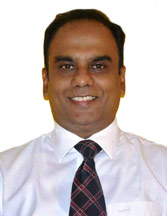|
October is Breast Cancer Awareness Month:
Think beyond pink
With 2,500 women diagnosed every month, breast cancer
in Sri Lanka is more than a pink ribbon issue:
by Carol Aloysius
|

Self examination of breast |
Breast cancer has, in recent years, emerged as the commonest cancer
in females, with the Sri Lanka Cancer Registry recording 2,500 diagnosed
cases every year. This is one of the most preventable of all cancers
that afflict women from 15 years and upwards, yet, due to the vast
majority of women delaying early screening tests, which are available
free in all state hospitals, or even spend a few minutes doing self
examination of the breast, breast cancer has become a scourge haunting
women of all ages. This Breast Cancer Awareness Month, Dr. Lakshman
Obeysekera, Oncologist at the Maharagama Cancer Hospital shares his
hands on experience in treating women with breast cancer, noting
that Time is an important factor, especially for vulnerable women who
already have higher risk factors than others. He also encourages all
those with a family history of the disease to get themselves clinically
examined, at least once a year for early detection and a longer life..
Excerpts…
Q: As the Maharagama Hospital is the country’s leading
institute for cancer patients, have you seen a significant increase in
female cancer patients compared to previous years?
A: There has been a change in the type of cancer women now
have. In 1995, during my internship, most women who came here had
cervical cancer. Today there are more women with breast cancer than
cervical cancer.
Q: How did this happen?
|

Dr. Lakshman Obeysekera |
A: One contributory factor was the health and awareness
raising programs we conducted. The other, which helped reduce cervical
cancer cases, was the pap smears regularly carried out on all females
both in the hospital clinics and outside. If the same thing can be done
for breast cancer, we can reduce the number of cases. Continued
education of school girls also goes a long way in raising awareness on
cancers that commonly afflict women.
Q: With regard to self examination, what is the best way to do
it and what is the best time?
A: First it should be done regularly and five days after
menstruation. Keep your palm flat and move it in a circular manner.
Don’t point your fingers to the breast and feel it as you will then
feel small lumps everywhere, which could be alarming and misleading. Do
this at least once a month or more. It will take only a few minutes. If
you find any suspicious lumps, seek the advice of a trained professional
without delay. Although this is such a simple test, we found that very
few of our cancer patients had ever done a self examination.
Q: Can someone other than a doctor do the examination?
A: Their partners or husbands can follow our guidelines and
examine their breasts for cancer signs. But it should be done especially
in vulnerable women to prevent early lesions leading to cancer.
Q: Who are the women who you just referred to as ‘vulnerable’?
|
Early
detection is the best protection
The Sunday Observer also spoke to
Consultant Community Physician, National Cancer Prevention
and Control Campaign, Dr Suraj Perera on what the Campaign
is doing for Breast Cancer Month.
Q: What is
the message of this year’s World Cancer month?
A: We have
three messages for the public this year: ‘Early Detection of
Breast Cancer; Early Detection Saves lives’; Early Detection
is the best protection.’
Q: Why are
these messages so important?
A: Because,
yearly 2500 breast cancers are detected.
Q: What are
the programmes you have for early breast cancer detection?
A: Raising
awareness among women of the disease, symptoms signs and
risk factors. Telling them about the high survival/cure
rates and quality of life they can enjoy if detected and
treated early: Encouraging them to undergo periodic breast
inspection and palpation and to seek prompt medical
attention if any abnormality suspected. We also started
awareness and training programs for all our health workers
from grass root level up to detect different signs and
symptoms of breast cancer among women at primary level and
refer patients to a clinician. In addition, they are taught
how to counsel patients and families
Q: What about
self breast examination?
A: We have
informed women through our well woman and maternity clinics
and through specially printed flyers in Sinhala and Tamil,
on the importance of self examination for breast cancer. All
females from the age of 20 need to do the self breast
examination every month.
Q: How often
should a woman have a clinician examination of her breasts?
Who will do this examination?
A: Every
three years from ages 20 to 40. Yearly after the age of 40
years. The service providers will include: medical officers,
Public Health Nursing Sisters, nursing officers, Public
Health Midwives
Q: From
statistics you have collected , the spike in cancer of all
types in Sri Lanka has soared tremendously, with breast
cancer said to account for 25 percent of all female cancers
in the country, although the numbers of deaths has dropped
due to awareness raising by the Health Ministry, and better
intervention techniques. What is your vision for the future?
A: The NCCP
is the national focal point for prevention and control of
cancers in the country, responsible for policy, advocacy,
monitoring and evaluation of prevention and control of
cancers and conducting surveillance of cancers and
facilitating research related to cancer.
It coordinates with all cancer treatment
centres, national level institutes, and provincial health
ministries to implement cancer control activities in Sri
Lanka. NCCP activities are supported by the World Health
Organization (WHO) Country Office Biennium.
The NCCP is further supported by the joint
program of WHO, International Atomic Energy Authority (IAEA)
and Program of Action for Cancer Therapy (PACT) for
improving facilities for improving facilities for cancer
care and capacity building. |
A: I refer to familial cancer. If there is a family history of
breast cancer, endometrial (womb) cancer or a colon cancer on the
mother’s side and on the father’s side prostrate or breast cancer, it
puts that person at very high risk of getting the disease later. So we
have to identify these risk factors by identifying the cancer gene
early.
Q: How? What are the newest techniques used?
A: A BRCA gene test. This is a blood test that uses DNA
analysis to identify harmful changes (mutations) in either one of the
two breast cancer susceptibility genes — BRCA1 and BRCA2. Women who have
inherited mutations in these genes face a much higher risk of developing
breast cancer and ovarian cancer, compared with the general population.
Inherited BRCA gene mutations are responsible for about 5 percent of
breast cancers and about 39 percent of ovarian cancers. If this gene is
identified in a healthy person early, before she gets the disease, that
person has a very high chance (between 60-70%) of getting breast cancer
- around eleven times a higher risk to breast cancer than other women.
Q: Your advice to such women?
A: Marry early and have your first child before 30 years.
Refrain from taking hormones or birth control pills. Breast feed your
child for as long a period as possible. We also give them the option of
having skin sparing prophylactic mastectomy i.e. remove the natural
breast and undergo plastic surgery where you implant a silicon implant
to preserve the cosmetic appearance.
Q: Other risk factors for breast cancer?
A: Obese women are at higher risk to breast cancer due to high
animal fat intake. Working women in sedentary jobs and do not exercise,
and take hormone replacement therapy drugs, which raise their estrogen
levels are also at risk.
Q: Gaps you would like to see filled in the country’s premier
cancer hospital at Maharagama, by way of equipment etc?
A: We need an MRI machine and a PET Scan. Both are very useful
in identifying breast cancer in the early stages.
The MRI can identify cancer compressing the spinal cord. It can also
help plan Radio therapy as it can show soft tissue delineation better
than a CT scan. The PET Scan is needed to differentiate between active
cancer cells in active area of those who had previous treatment for
cancer. It is also important during the diagnosis clinical work up as it
helps to detect the primary site.
Q: Your advice to women and to the general public?
A: To women my advice is: If you are between 30- 35 years get
at least one proper breast examination by a clinician and thereafter
every five years. Do self examination of your breast regularly.
My advice to education authorities is introduce primary prevention of
cancer as a topic in the regular secondary school curriculum to raise
more awareness.
To employers, make it mandatory that all new women recruits to your
workplaces, undergo a breast screening test. If this is done it will be
easy for us to identify potential breast cancer patients as well as
those who already have the disease but are unaware of the fact.
Q: Suggestions to health officials?
A: We need to have a separate Palliative Care Hospital
specializing in pain management, and giving cancer patients quality care
till the end. A Hospice funded by the government, which looks after
cancer patients who have no one to look after them is also important
considering our ageing society |

